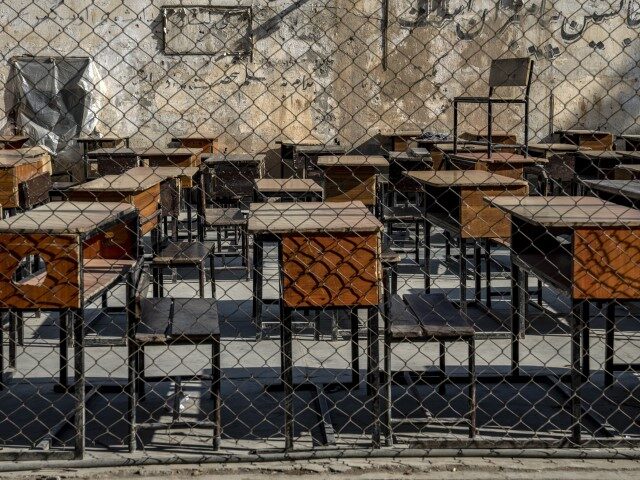Afghanistan marked three years since the return to power of the Taliban on Thursday as a repressive, dangerous place for women and girls, where nearly half a million girls are banned from secondary education and femicide is rampant.
The Taliban ruled Afghanistan for much of the 1990s and lost power in 2001 following the American invasion of the country in response to the September 11 al-Qaeda attacks. After 20 years of fighting, former President Donald Trump brokered a deal with the Taliban that would have seen American troops peacefully withdraw from the country by May 1, 2021, in exchange for the Taliban promising to break ties with terrorist organizations and not attack U.S. troops.
His successor, Joe Biden, broke the agreement, resulting in the Taliban launching a spree of conquest attacks that culminated with the fall of the nation’s capital, Kabul, on August 15, 2021.
The Taliban is currently the uncontested government of Afghanistan, though no other nation on earth has formally recognized it as such. Taliban jihadists celebrated the anniversary of their victory on Tuesday with a massive parade at the former Bagram U.S. air base, displaying some of the millions of dollars’ worth of weapons Biden abandoned in the country in 2021.
For the average Afghan, particularly girls and women, quality of life has essentially collapsed since the Taliban returned to power. Taliban leaders insisted three years ago that they would lead an “inclusive” government and insisted that provisions mandating women not leave their homes were short-term and intended to protect their safety. Rather than lifting that ban, however, the Taliban has increased its repression of women and girls, insisting that the “value” of women “decreases” if men can see their faces and declaring education prohibited for girls after primary school age.
The United Nations education agency UNESCO revealed in a report on Thursday marking the anniversary of the fall of Afghanistan that, according to its estimates, the Taliban have banned 1.4 million girls from receiving a secondary education.
“As a result of bans imposed by the de facto authorities, at least 1.4 million girls have been deliberately denied access to secondary education since 2021,” UNESCO said. “In just three years, the de facto authorities have almost wiped out two decades of steady progress for education in Afghanistan, and the future of an entire generation is now in jeopardy.”
The outlet also estimated that 80 percent of Afghan girls of school age are not receiving any education, an “increasingly massive drop-out rate.”
UNESCO noted that the Taliban have also damaged the ability of boys to receive an education – 1.1 million fewer girls and boys both are no longer in school since the takeover – by banning women from teaching boys, severely limiting the availability of educators for both girls and boys.
Outside of schools, human rights researchers have documented skyrocketing rates of violence against women in Afghanistan, even as the Taliban boasts of having improved the “security” situation for Afghan citizens. A study by the Centre of Information Resilience’s Afghan Witness project confirmed 332 reported cases of femicide – defined by the U.N. as an “intentional killing with a gender-related motivation” – since August 15, 2021, but warned that number is likely significantly lower than the true death toll.
“What we have collected is only the tip of the iceberg,” project director David Osborn told the British newspaper The Guardian. “[It is] more and more difficult for Afghan women to speak out and for us to document gender-based violence and the impact of Taliban rule on women and girls.”
Afghan Witness documented 840 victims of gender-based violence between January 2022 and June 2024, over half of which identified the Taliban regime as responsible for crimes such as “sexual violence, including forced marriage, sexual slavery, assault and rape,” as well as non-sexual violence.
The Taliban has ignored the dire situation facing women entirely in its propaganda celebrating the alleged return of “security” to Afghanistan.
“Our recent assessment indicates that security incidents have decreased by approximately 90% or more compared to previous years, and security has been established,” Interior Ministry spokesman Abdul Mateen Qani told the Afghan outlet Tolo News.
Tolo News, one of the largest media agencies in Afghanistan, has largely avoided critical reports on the Taliban since Taliban terrorists stormed its offices on August 16, 2021, and confiscated all its security staff’s weapons.
The Taliban’s top spokesman Zabihullah Mujahid insisted on Wednesday that “the entire country is secure, and there is no individual or group that is unauthorized, armed, or poses a threat either inside Afghanistan or outside of it.”
Mujahid also published an official statement on social media Wednesday on behalf of the Taliban “government” celebrating the anniversary of their conquest, applauding the Taliban’s commitment to sharia and jihad.
“The twenty-year infidel occupation and the martyrdom and sacrifices of our people against it left a great lesson for our future generations that should never be forgotten,” the statement read. “We commit to the Islamic system, which has been achieved through the great efforts of Afghans and in the shadow of which the ruling religion of Allah and Sharia [Islamic law] have been implemented.”

COMMENTS
Please let us know if you're having issues with commenting.